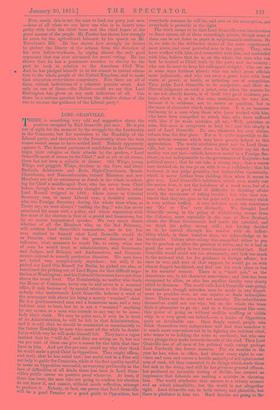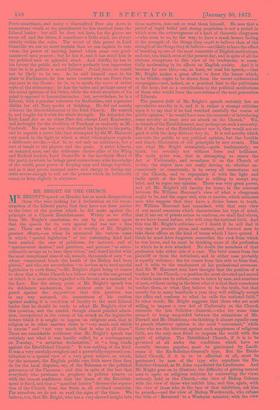LORD GRANVILLE:
THERE is something very odd and suggestive about the position occupied by Earl Granville just now. He is put out of sight for the moment by the struggle for the Leadership in the Commons, but his succession to the Headship of the Liberal party, and therefore to the Premiership when the turn comes round, seems to have settled itself. Nobody apparently opposes it. The fiercest partisans of candidates in the Commons begin their eulogies or their attacks by the preface, Lord Granville must of course be the Chief ;" and as yet at all events, there has not been a syllable of dissent. Old Whigs, young Whigs, and priggish Whigs, dwellers in the Cave and bitter Radicals, Aristocrats and Reds, High-Churchmen, Broad- Churchmen, and Nonconformists, trained Ministers and new Members are all as unanimous as Jonah in the whale in select- ing for Chief a middle-aged Peer, who has never been Chief before, though he was seriously thought of, we believe, when Lord Russell resigned in 1866 ; whose career as Colonial Secretary was, in many Liberal eyes, a doubtful success ; who was Foreign Secretary during the whole time when, as Tories say, we were always " trailing the flag ;" who has never associated his name with a policy, and whose reputation with the mass of the electors is that of a genial and humorous, but by no means impassioned speaker. We very much doubt whether of all the Members who, on the 3rd February, will confirm Lord Granville's nomination, one in ten has ever realised to himself what Lord Granville would do as Premier, what would be the general direction of his influence, what measures he would like to carry, what sort of men he would trust as administrators, and Governors, and Judges, and Bishops, and Ambassadors, and Commis- sioners ordered to remedy particular disasters. His men have not failed very conspicuously anywhere ; but still, if he picked out Lord Odo Russell for Berlin, he picked out also, or sanctioned the picking-out of Lord Ripon for that difficult nego- tiation at Washington ; and his Colonial Governors have not risen above the usual level. The Premiership, no matter who leads the House of Commons, never can be and never is a nominal office, if only because of its special relation to the Palace, and nobody who understands Lord Granville believes a word of the newspaper talk about his being a merely "nominal" chief. He is a good-mannered man and a humorous man, and a very indolent man to boot, but he is not a " nominal " anything by any means, or a man who intends in any way to be some- body else's cloak. We may be quite sure, if ever he is head of an Administration, he will be felt in that Administration, and it is odd that he should be nominated so unanimously to the future Headship by men who must all the while be doubt-
ful in which way he will make himself felt. They have a vague instinct that he " will do," and they are acting on it, but not ten per cent. of them can give a reason for the faith that they have in him. And not five per cent. could say why they think he would make a good Chief in Opposition. They might affirm, and truly, that he has social tact ; but social tact in a Peer will not help to guide the Commons, while of the first quality needful to make an Opposition successful, unwearying pertinacity in the face of difficulties of all kinds, there has been in Lord Gran- ville's public career no positive proof whatever. At least, if there has been, the men who are going to confirm his election do not know it, and cannot, without much reflection, attempt to produce it. Nobody, in fact, can prove that Lord Granville will be a good Premier or a good guide in Opposition, but everybody assumes he will be, and acts on the assumption, and everybody is probably in the right.
The truth seems to be that Lord Granville owes his elevation to three causes, all of them exceedingly potent, though none of them can be set down on paper in epigrammatic sentences. He is, we take it, the deliberate choice of the most experienced, most acute, and most powerful men in the party. They, who have worked with him, and counselled with him, and contended with him, believe that he is, on the whole, the man who can best be trusted as Chief, both by the party and the country ; who can do most to keep his colleagues straight ; who can see in some ways furthest ahead ; who can select great officials most judiciously, and who can sway a great force with least waste of power, or bustle, or irritating use of compulsion.
They judge Lord Granville to be competent, and their de- liberate judgment on such a point, even when the reasons for it are not clearly known, is of itself very good evidence, per- haps, when it is, as in this case, unanimous, the very best, because it is evidence, not to career or qualities, but to
the mass of character which inspires trust. It is an immense testimony to a man when those who have worked with him., who have been compelled to watch him, who have suffered with him if he made mistakes, all say, ' Well, mistakes or none, this man is competent to lead us ;' and this clearly is said of Lord Granville. No one, whatever his own claims, refuses him the first place. Nor is it quite impossible to dis- cern serious reasons which may have greatly helped to this appreciation. The world attributes great tact to Lord Gran- ville, but we suspect those close to him would say his first quality was not tact—which, however useful in a Foreign Sec- retary, is not indispensable to the government of Empires—but political nerve ; that he can take a strong step ; that a course once decided on, he can go on with it even ruthlessly ; that his bonhomie is not pulpy geniality, but indiarubber equanimity, which is never farther from yielding than when it seems to give way. Lord Granville's indolence, which once nearly cost the nation dear, is not the indolence of a weak man, but of a man who has a good deal of difficulty in thinking affairs worth the annoyance of taking trouble ; but who once con- vinced that they are, goes to his point with a persistency whick is very seldom baffled. A very indolent man can sometimes say 'No ' or ' Yes' very distinctly. We thought Lord Granville wrong in his policy of withdrawing troops from the Colonies, more especially in the ease of New Zealand, where the Home Government had made the mischief, and we think his policy wrong still ; but having decided on it, he carried through his resolve with an inflexi-. bility which, in these boneless days, we acknowledge to be invaluable. Colony after colony was compelled either to pay for its garrison or allow the garrison to retire, and be it bad or good, the new policy in two years became a settled fact. Earl Granville would avoid war too strenuously, and look too much to the national wish for his guidance in foreign affairs ; but once in war, and sure of that support, he would go on with almost dogged hardihood, and find out the weak place at last in his enemies' armour. There is a " hard pan," as the Americans say, in his character somewhere; and this has been recognised by allies, as also has another faculty very closely allied to firmness. The world calls Lord Granville easy-going, but somehow, though mistakes may be made in any depart.. ment he presides over, no one expects or finds indiscipline there. There may be error, but not anarchy. The subordinates themselves could not say why, but on the whole the tear finds it pleasanter to go on ; and in a Government like ours, this power of going on without audible scuffling or visible whip is a very great one indeed,—to a leader of Opposition quite an invaluable one. Once firmly seated, people whe think themselves very independent will find that somehow it is much more convenient not to be fighting the indolent chief, who seems to be holding the reins so carelessly, but who sees
every plunge they make towards the side of the road. Then Lord
Granville has of all men of his political rank, except perhaps Lord Cardwell, the fewest enemies. For six months in the
year he has, when in office, had almost every night to con- vince and coax and coerce a hostile majority of self-opinionated men of rank, till they consented to do things which made them feel sick in the doing, and still he has given no general offence, has produced no incurable feeling of dislike, has created no impression that Liberals are making a mistake in choosing him. The world attributes that success to a velvety manner and an adroit plausibility, but the world is not altogether right. Lord Granville can be both velvety and plausible, but there is gladiator in him too. Hard knocks are going in the
Peers sometimes, and many a discomfited Peer sits down in momentary wrath at the punishment he has received from the Liberal leader ; but still he does not hate, for the gloves are never off, and the blows, if sometimes a little cruel, are always strictly within the rules. The secret of this power in Lord Granville we can no more explain than we can explain its con- verse, the power of exciting hatred which some very good- mannered men possess ; but he has it, and it has stood him in the political race in splendid stead. And thirdly, he has in his favour the public and we believe perfectly true impression that he is in politics a sound Liberal. Prima facie, he would not be likely to be one. As he said himself once in his place in Parliament, he has more cousins who are Peers than any man in the House ; he is, so to speak, the nexus of entire septa of the aristocracy; he has the tastes and perhaps many of the social opinions of his Order, while the whole structure of his mind is opposed to humanitarianism ; but, nevertheless, he is a Liberal, with a genuine tolerance for Radicalism, and a genuine dislike for old Tory modes of thinking. He did not merely tolerate the disestablishment of the Irish Church. He wanted it, and fought for it with his whole strength. He defended the Irish Land Act as no other Peer did, except Lord Kimberley, and he fought for the abolition of Purchase as zealously as Mr. Cardwell. No one has ever distrusted his loyalty to his party, and he regards a move like that attempted by Sir W. Harcourt very much in the light in which a strict whist-player regards a deliberate revoke,—that is, as not only an unfairness, but a sort of insult to the players and the game. A strict Liberal, an unhated man, and the deliberate choice alike of the Whig and Radical leaders, Lord Granville is the inevitable Head of the party, to which he brings great eonnections, wide knowledge of the world, great power of keeping men and things together, and as it may prove, unusual nerve and energy in facing any crisis severe enough to call out the powers which he habitually seems to keep slightly in abeyance.



































 Previous page
Previous page